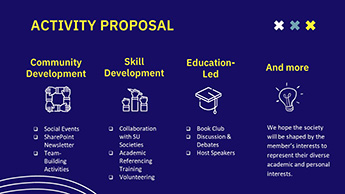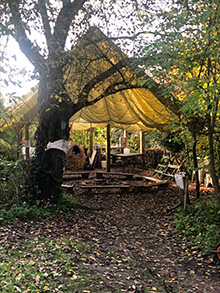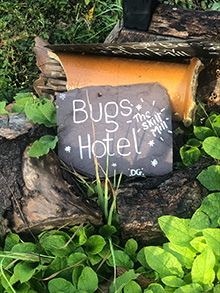BA Education Student Activities
This page highlights some of the activities our students get involved in while studying the BA Education. It gives you a insight into how you can fully immerse yourselves into both the academic and social aspects of the BA Education course and enhance your learning experience whilst studying with us.
This page will be updated throughout the year so please check back at a later date.
Students in Classrooms (SIC)
Tamara Ofori-Atta Bossman decided to join the Students in Classrooms (SIC) scheme, a joint venture run by the University of Nottingham and Nottingham Trent University.
SIC facilitates university students working with young people in local schools. They act as a positive role model in supporting pupil development, whilst also increasing the awareness of higher education and the pathways that allow young people to access higher education.
The application process involves a few steps, each one assessing your suitability for the scheme. Training is then given to successful applicants to understand your individual role and safeguarding issues.
I applied for this role because I felt like this was a perfect opportunity to further my understanding about my education degree as well as giving back to the wider community. I will be working at Huntingdon Academy with year 4, helping them with their reading for 10 weeks. I am very excited for this role and can’t wait to work with the young kids and hopefully have an impact on them
Introducing boggarts
As an induction week activity, local eco-artist, Ruth Lewis-Jones worked with our first-year students in our newly created outdoor learning and community space on Jubilee Campus. Students worked in groups to create tree boggarts out of clay. Boggarts are mythical creatures representing our worst fears, so our students discussed and shared some of their fears about starting university, moving away from families and friends, moving to a new city, confidence about studying at UG level and such. The boggarts were designed to stay in the trees until they gradually disintegrated and returned to the soil.
New Modes and Sites for Learning module
One of the highlights of this module for year three students are the fieldtrips they participated in.
A visit to Sherwood Forest was a good opportunity to learn in a non-classroom environment with the help of the information boards while walking around.
A visit to the Archaeology Museum on University Park Campus allowed a different kind of experiential learning which stimulated their curiosity about ancient lifestyles and the development of human civilisation.
They read picture books and created their own. The song writing class was a creative lesson that everyone engaged in and they created and recorded a class song. The opportunity to lead reading groups gave them the chance to step out of our comfort zone and discuss issues with people of different cultural backgrounds.
This is a great module if you want to investigate how formal and informal spaces support learning.
Education Society
This society is centred around education and aims to create a sense of community whilst providing social and academic suppport in regards to education by facilitating the development of social connections and transferable employability skills. It offers a space in university to meet new people, socialise, share ideas and of course have fun.
Click image to enlarge for details of activities.
Year one induction week - breaking the ice
Pippa Oldacre, shares her experience of meeting her new classmates
Being a new student at any university can be daunting and feel overwhelming at times. For me, the main way to feel more relaxed and ‘at home’ is to meet like-minded people and start making new friends. In our first week, our Course Leader, Jenny Elliott, set us the challenge and activity to do just that.
We were set the task to arrange a trip to a place in Nottingham city centre, with the aim to get to know each other and Nottingham better. This seemed very hard initially as we didn’t have any phone numbers or even names of our fellow students. However, the challenge of organising this task is what made this activity so effective. Some names started to appear on the sign-up sheet, which had five places to choose from, and at the induction events in the days leading up to the trip, we started organising our visit.
A group of us met at Stonebridge City Farm to feed some animals. It was a lovely few hours but also really useful, as not only did we get to feed really cute goats and a big chunky cow, we also got to know each other even more. We discovered each other’s passions in education, why we have chosen to study this course and our future goals and aims that we have in mind after we’ve graduated. We quickly found many similarities, and all the talk about education created more excitement about starting our course the following Monday. It was especially interesting to get to know Peter, as we were able to talk about cultural differences and similarities between our childhoods in the UK compared to his in Hong Kong.
The trip was a great way to start the academic year. Being able to go into our first lectures knowing faces and names quickly created the community atmosphere between students.
The Learning Community Forum (LCF)
In the School of Education we are proud of our student satisfaction ranking, but are continuously looking at ways to improve. Through our Learning Community Forum (LCF), elected course representatives and surveys such as the National Student Survey (NSS), our students have the opportunity to influence their academic life and make a meaningful impact on the future of the school.
Annie Shepperson and Emily Pearce, explain what is involved in being a course representative.
The LCF, is a shared space which allows course reps to ask questions or feedback any concerns from their fellow peers to academic staff. A positive aspect is that it allows a strong link of communication between staff and students and forms relationships that allow anything to be said, and nothing to be ignored.
We have seen the positive effect of having a student representative interact with staff...issues that are raised are resolved quickly after the meeting, meaning we can share this with other students across the years to keep them in the loop. As course reps we have a responsibility to ensure students are satisfied with all elements of the BA Education course.
Usually, a course rep would collect feedback from lectures and seminars during discussions, but this last year it’s all been done online so we’ve had to adapt. Online surveys have worked well and allowed students to give their feedback anonymously if they prefer.
Being a course rep allows you to contribute to positive changes. The LCF meetings are efficient and organised and students are informed of dates/times in advance. The meetings are followed up with minutes and appropriate actions to accommodate any feedback given.
Shree Hooton explains why she became a course rep
Shree is a little older than most of our undergraduate students and sees herself as an “experienced learner”. A lot of people refer to her as ‘’mother-hen’’ and she is happy to sit and listen to both the issues and the positive things about university life.
As a student rep, I am here to be your voice. Part of my role is to collate and communicate the views of all the students I represent. As university students we are under a lot of pressure to achieve and gain the best results we can. I want to be able to help with some of the concerns and issues that commonly arise, that could be discussed at either regular meetings with the department leads or the LCF meetings. With the final aim for positive changes.
Charity projects
The Developing Ethical Professional is a year two core module which supports you to develop the academic skills you need to successfully undertake advanced, independent study and research in education. Core to the module is a focus on ethics and values in professional life and it explores how educationalists may find fulfillment and satisfaction through developing an ethical, values-based stance on their work. You will engage with a charitable fund-raising project as part of the module and you can see below some of the charities our students have supported.
Louise McGrory and Charlotte Lee chose to raise money for
The Honeypot Children's Charity, which supports over 800,000 young carers within the UK who provide emotional support and daily care to a loved one. A small social media campaign helped them sell raffle tickets to raise £50.
Marcus Akester, Jodie Mifsud, Rachel Ickeringill, Hannah Lygo and Benedict Purvis raised money for their chosen charity,
CoppaFeel!, the first breast cancer charity in the UK to solely create awareness amongst young people.
Megan Lees, Abigail Malloy, Aqsa Ahmed and Safa Mahmood raised £123 with their raffle for
When you wish upon a Star, a Nottingham-based charity that makes dreams and wishes come true for children with life-limiting illnesses.
Field trip to St Anns Community Orchard
Georgia Burger describes her group visit to St Anns Community Orchard, where the aim was to show the importance of outdoor learning and the wonderful opportunities that it provides for children.
Georgia says:
It was very striking speaking to the other students who experienced the trip. I found a lot of them really struggled with the idea of completing physical tasks. It gave me a great appreciation for how I lucky I was as a child to be given the opportunity to go outside as a child and explore. I was even able to go to things like forest schools where I'd learnt to make forts and fires.
We found ourselves having a discussion at the end about how this type of learning could positively impact the community. The general consensus was that children provided with this type of learning were able to do things that they may struggle with in class. For those children who struggle with maths and English, they can lack the confidence in lessons that is required to explore their learning. However, if you take these struggling children and put them in an environment where they prove to themselves they are capable, this confidence can then be transferred into the classroom.
Not only children can be positively affected, but elderly people too. Bringing elderly people to outdoor spaces like the community garden allows them to get mobile again. They can use skills which they wouldn’t if they’re stuck inside. It can help fight against dementia and other diseases that elderly people have to tackle.
A wonderful and welcome place to explore and relax whilst learning more about our course.


Volunteering with the Phab Nottingham
Evvie Panayiotou became a volunteer with Phab Nottingham when she came to university.
Phab is a national charity with almost 200 clubs around the country. They organise fun activities and days out for children and young adults with disabilities between the ages of 13-18.
This is society is an amazing way to meet new people and to make a difference to young people and local families. My favourite thing about Phab is seeing the members’ faces light up on trips - just seeing them smiling and enjoying themselves is so rewarding! It is an incredible and inclusive society very close to my heart and is a great part of my uni experience.
Phab events include:
- local pantomime and a pizza making masterclass
- animal experiences and pottery painting
Phab training for volunteers
Phab offers volunteer training on disability awareness, safeguarding and first aid and covers the cost of Disclosure and Barring Service (DBS) checks.
Phab Nottingham website
Follow Phab on Instragram:
Volunteering with IntoUniversity
Fatima Suleman, wanted to gain some more experience working with children in an educational setting to prepare herself for the placement module in year two. Through the university, she was aware of the organisation Into University and following registration and training started a mentor role.
So far I've completed three sessions with my mentee and I've found it to be a very rewarding experience for both of us in the sense that I can offer them support with what they want to do, and I can also develop skills such as problem-solving and communication through working with them. I would strongly recommend this for anyone looking into gaining experience in the education sector.
Fatima is also gaining experience by volunteering with Bookmark, an online platform where you can help a child learn to read by spending 30 minutes with them, twice a week, reading books and playing games.